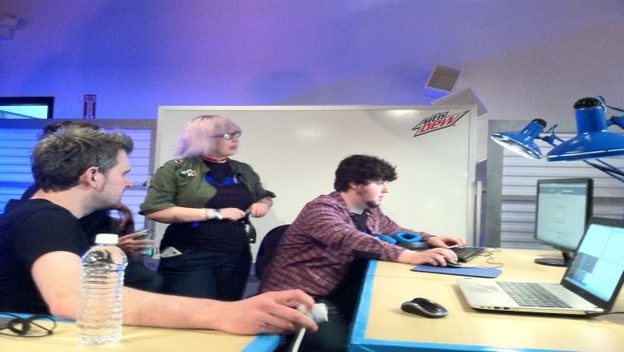While I’m proud to be a gamer, there are lots of things about the gaming community that I hate. I hate that every time I try to get a Call of Duty match in, I have to sit through hordes of 14 year olds slapping around the N-word in an attempt to sound cool. I hate that any game not made for a straight white male suddenly becomes vilified, and that the very idea of making games with important protagonists from a variety of races, sexes, and walks of life immediately gets panned as stupid, useless, pointless, or worst of all “making an issue out of nothing” by people who are too afraid to see anything other than a chisel chinned space marine on the screen. I hate that everything has to be so sensational, with every single convention passing being another practice of the coolest explosion and the most realistic bullet physics in a medium that seems to be filled with 375 clones of Michael Bay for every one intelligent indie designer with a message.
Yet, despite all my hate, I stick with this industry, partially because I have a lot of faith in it as a young medium, and partially because all these faults, are really just the faults of humanity at large, so I can’t hold it against gaming alone. Nothing has both reaffirmed by faith and pessimism at the same time than Game_Jam’s monumental failure. This was more than just the crashing and burning of a reality TV show. This was a community standing up and saying “we won’t take this anymore.”
For those of you who aren’t in the loop, Game_Jam was a show that was planned to be broadcast over Youtube. The concept was that indie game developers and internet personalities would get together in teams to make small indie games, and the winners would take home some awesome prizes. Yes, it was basically just another reality show, with challenges and drama and fake provoked interviews, and it didn’t last a day.
I’m going to do my best to give you a rundown of what happened at the event. If you want a longer and more gory summary, Jared Rosen’s fantastic article on IndieStatik covers it quite well. Basically, the people making the show just didn’t get what game development was about to an extreme degree. In fact, they didn’t get what gaming itself was all about
Mountain Dew came in as a sponsor, and so everyone on set was forbidden to drink anything other than Mountain Dew and water. However, several people got in trouble for not holding the can correctly, not expressing enough joy when drinking the beverage, and simply having things like tattoos or nail polish be seen when drinking the beverage.
Contracts were absolutely horrible, and they actually forbade game developers to do any sort of work or appear in any sort of broadcast media when the show was airing. They were asked to put their livelihoods on hold so that the show could air. In fact, many of the participants never even signed their contracts for this very reason. To add insult to injury, the contracts even allowed the contestants to be misrepresented on TV for “dramatic effect.”
The equipment was buggy and faulty. In fact, several of the computers that were supplied were full of malware, and much of the first day of filming was spent just getting the computers to work. Many of these computers did not compare to the simple technology most internet personalities have at their disposal. In fact, at one point Markiplier showed that his cell phone receiver was better at recording audio than the provided headsets.
The prizes were also a joke. All of them were Mountain Dew themed, from lawn chairs to a year’s supply of soda. The “best” prize was being entered into Microsoft’s ID@Xbox program… something basically every contestant already had access to.

But none of this got the contestants to walk out. It was the actions of one man, Matti Leshem, that were the straw that broke the Camel’s back. Matti frequently tried to get people to fight on camera because, you know, that’s what people do in reality shows. However, he could not even get JonTron to fight with Zoe Quinn, two people that Jared Rosen describes as certain to rub each other the wrong way. Leshem tried to get a fight between them on camera, but nothing took.
So Leshem pushed harder, and the question that finally made the whole $450,000 project crash was “Do you think the teams with women on them are at a disadvantage?” Right there, Leshem characterized all that I, and many people, hate about the gaming industry. He pocketed all females into this inferior space, just because they were female. Not only that, but he was playing both sides, in the sleaziest way possible. He asked teams with girls on them whether or not they thought they were at an advantage because they had “pretty girls” on their team. Once again, all the female developers were downgraded to pretty faces, all in an attempt to get a rise out of the contestants.
And a rise it did get, as the contestants decided they would not stand for this. One by one they began to walk off set, leaving the project nothing more than a smoldering $450,000 crater of a catastrophe. All attempts to salvage the show failed, and every internet personality and game designer went their own way.
This, by the way, is why I still have faith in the gaming industry at large. Because, all the things I complain about–all the sexism and toxicity that I write about in my articles here in Cheat Code Central–It’s not the gaming community at large that feels that way. On the contrary, it’s a few very vocal people with an unfortunate amount of people listening to them, like Matti Leshem. The gaming community is represented in the internet personalities and game designers that, in a show of solidarity, walked off the set together. They stood up and said “we aren’t going to stand for this.” They said that this show, this wasn’t what gaming is about.
At its core, gaming is about togetherness. Games evolved out of a need for social interaction. Pong, one of the first video games ever, needed a player two. Ever since then, gaming has blossomed into a variety of interesting fandoms, from JRPG fans, to speed runners, to pro fighting gamers, to, yes, even Call of Duty bros. We all come together because we love games and want to share that love with other people. Gaming isn’t about hating each other, or causing massive outbursts of drama. Gaming is about having fun, which is what the guys behind Game_Jam simply didn’t get. They saw gaming as the sensationalist, toxic atmosphere that it seems to be on the outside, without being able to see the real awesome core of respect at the center of it all. It’s that core that keeps my faith in gaming and the gaming industry alive, and I think it says good things for all of us as gamers.
